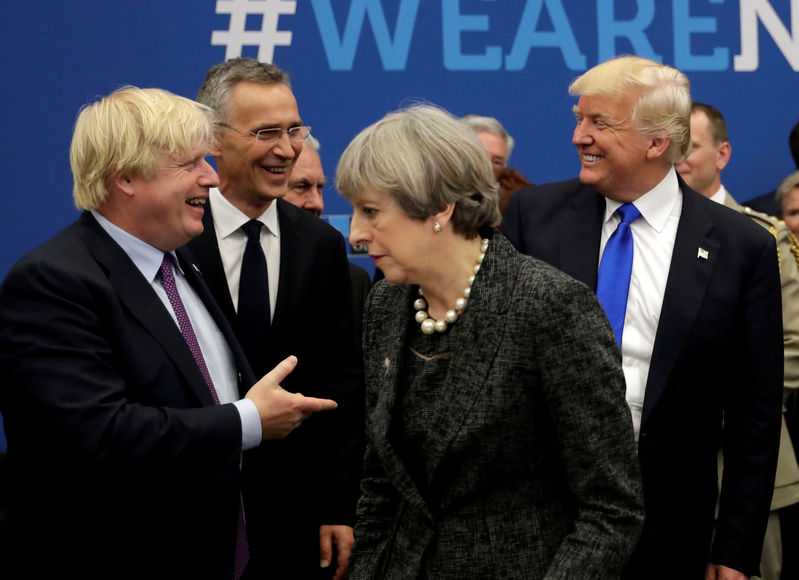Will ‘Britain Trump’ reboot U.S. ties?
25 July, 2019

The much-vaunted chemistry between Boris Johnson and Donald Trump has been touted as a chance to reboot the “special relationship” between Britain and the United States, but the mercurial pair may find it harder than expected to get along.
Trump was quick to congratulate “Boris” after the former mayor of London won the race to become Britain’s new prime minister Tuesday. “He will be great!” Trump tweeted.
That enthusiasm was in marked contrast to comments he had made about Johnson’s predecessor Theresa May, who he said in a previous tweet had done “a very poor job” on Brexit.
Ties between the traditional allies had waned under Trump and May, reaching a low point with the resignation of the British ambassador to Washington, Kim Darroch, whose leaked diplomatic cables described the Trump administration as “inept.”
But Johnson, who was born in New York, “represents a distinctly pro-American outlook with a deep-seated affinity for the transatlantic alliance,” said Nile Gardiner, a former aide to Margaret Thatcher who now works at the Heritage Foundation, a conservative U.S. think tank.
The new leader of the Tories is determined to leave the European Union — something the anti-globalist Trump fully endorses — by this autumn and forge closer ties with Washington.
“We could see the closest partnership between the leaders of the U.S. and the U.K. since the days of Ronald Reagan and Margaret Thatcher,” said Gardiner.
The two men seem to be birds of a feather, from their flag-waving populism right down to their erratic blond coiffures.
“In principle they are ideological compatriots, on the right, more populist in orientation, anti-political correctness, anti-establishment,” said Ian Bremmer, head of the Eurasia Group, which conducts international political analysis.
But he noted that their relationship, on closer examination, is “much more volatile and uncertain.”
“Boris Johnson and Donald Trump have similar personalities and similar orientations towards the media,” Bremmer told AFP. “Neither of them are ideological, neither of them care as much about the issues as they care about themselves.”
That analysis appeared to be borne out by the U.S. leader himself on Tuesday, who praised Johnson as “Britain Trump.”
With two big personalities obsessed with the spotlight, sparks may well fly. Johnson, renowned for his blunders, could easily get on the wrong side of the notoriously thin-skinned U.S. leader.
“Boris Johnson has offended a lot of people that are less easily offended than Donald Trump,” said Bremmer.
Interests not always aligned
And their relationship has not always been so cozy either.
In 2015, when the former reality TV star was running for the White House and claimed that parts of London were no-go areas because of Islamic radicalization, Johnson — the city’s mayor at the time — shot back saying he would not go to some parts of New York because of “the real risk of meeting Donald Trump.”
Since then, Johnson, who briefly served as foreign secretary, has often distanced himself from the U.S. leader, including on the subject of Trump’s recent attacks on four junior congresswomen which were widely condemned as “racist.”
Johnson also opposed Trump on Iran, going as far as leading a delegation to Washington last year to try in vain to convince him not to walk out of the 2015 deal to curb Iran’s nuclear program.
Iran provided another strain on the special relationship this week after the Trump administration made it clear that it viewed Tehran’s seizure of a British oil tanker in the Gulf as being a British problem, not an American one.
And while the U.S. president has dangled the promise of a “phenomenal” trade deal with post-Brexit Britain — an offer Johnson has used to convince supporters that the divorce from Europe would not be a disaster — talks between the two sides may be fraught.
“While the two leaders have an affinity, their interests are not always aligned,” said Luigi Scazzieri of the Center for European Reform in London.
“Johnson’s ambition to strike a trade deal with the U.S. may be frustrated by Trump’s ‘America First’ instincts,” he said.
“Trump is unlikely to make any concessions to the U.K. in a trade negotiation, instead seeking maximum advantage for the U.S. by forcing the U.K. to open up its agricultural sector and health service: requests that may make it impossible to reach a deal at all.”
Source:
TAG(s):
